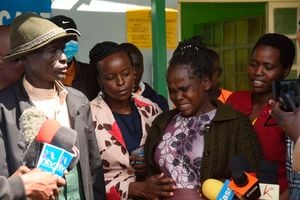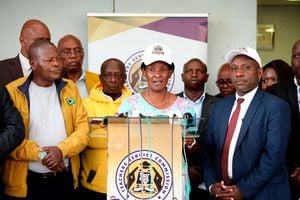Silent workhorse that lives on cherished beautiful game

Former Tusker head coach James Nandwa who was sacked after a lacklustre season.
What you need to know:
- Player and captain Nandwa won titles for 20 years and is a successful coach
At the dusty Ruaraka grounds, home of Tusker FC, players mill around James Nandwa to get tips on winning. Very few, if any, can remember having seen him play, but they respect him – not because of what they have heard about his playing days but for the fact that he is their coach.
Besides the big two of Kenyan football – Gor Mahia and AFC Leopards – Tusker is the other most successful club. But this season they failed to win the title.
“We performed poorly by our standards. We should have wrapped up the title but we slackened. But we will come back stronger next season,” he said. “It’s always the ambition of any coach to lead a team to success. Anything short of that is unwelcome and I know I need to win something with Tusker. And that I must.”
Nandwa graced Kenyan soccer for 20 years, even captaining the national team, Harambee Stars, from 1993 and winning the 1997 Premier League title and the defunct Transparency Cup in 2004 with Utalii FC.
He started off as a striker and then as a midfielder before retiring when he was a central defender. But while most players quit before they were barely 30, Nandwa played until he turned 40.
Three generations of footballers left him on the pitch, and by the time he was nearing his sunset years in football some of his team mates were half his age.
He played alongside the likes of Allan Thigo in 1979-80 and then the Sammy Onyango “Jogoo”, Abbas Magongo, Wilberforce Mulamba, Mahmoud Abbas generation of the 1980s.
Then came the 1990s squad of Vincent Kwarula, Musa Otieno and Dan Ogada, Henry Motego, with whom he also played.
When that generation retired, Nandwa was again the last man standing. John “Mo” Muiruri joined him at Utalii when he was 37; Muiruri was 20 then.
“It was all about self discipline. Playing at the top level for twenty years is not easy. Many players today can barely play for ten because they lack discipline.”
Talent does the talking
Soft-spoken Nandwa is among the best coaches in Kenya, yet in the same way he carried himself as a player, letting his talent do the talking for him, so has he done with his coaching.
He was the top scorer in the national league for three consecutive seasons – 1984 to 1986 – yet it is the likes of JJ Masiga, Mulamba, Ambrose Ayoyi and “Jogoo” that hit the headlines.
Even as a mature player, Nandwa did not lose his scoring touch. In 1997 when Utalii – comprised of Utalii College students – broke the dominance of Gor, Leopards and Kenya Breweries (now Tusker) to win the Premier League, he was their inspiration, scoring 13 goals to finish runner-up in the top scorer’s list.
“That [Premier League] victory crowned my career. I won the league title just when I was about to retire, and with a team made up of players some of whom were 17 years younger than me,” said Nandwa, who played for the Thika-based Kenya Taitex Mills for six years.
“KTM was a strong team, but we were always in the shadow of Gor Mahia and AFC Leopards. I craved the title those days [1980s] but we must agree that those years belonged to the two giants.”
Nandwa launched his career in the top-flight league aged 19 years, then with Hakati, and for decades he was a pivotal to the national team’s success, winning three East and Central Africa Senior Challenge titles between 1981-1983.
Yet it is difficult to understand why he never played for one of the ‘Big Three’.
“Those were the years when Kenyan soccer was overflowing with talent. I would pity, for instance, the Gor Mahia or AFC Leopards coach because just picking the first eleven was a headache. Literally, every player was good. What of the national coach, who had to pick about twenty players from over eighty talented players?”
But Nandwa always found his way into the national team. He quipped: “If I was not good enough for AFC Leopards or Breweries or Gor Mahia, then I wouldn’t have made it to the Harambee Stars.”




